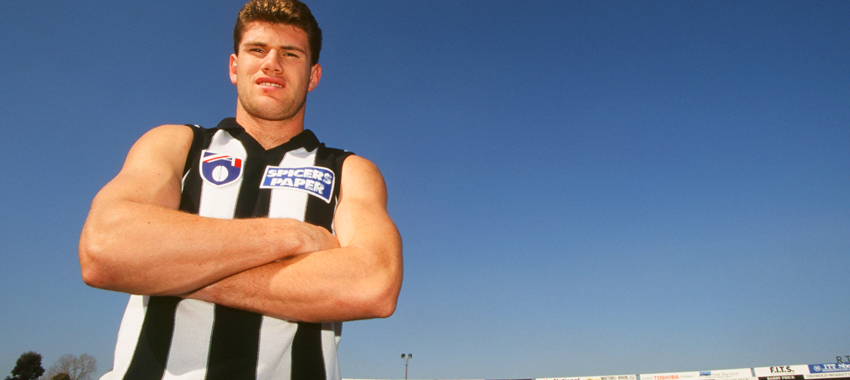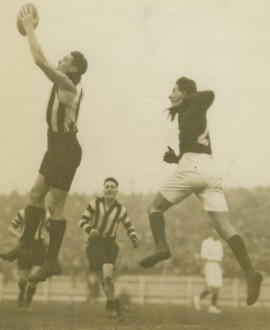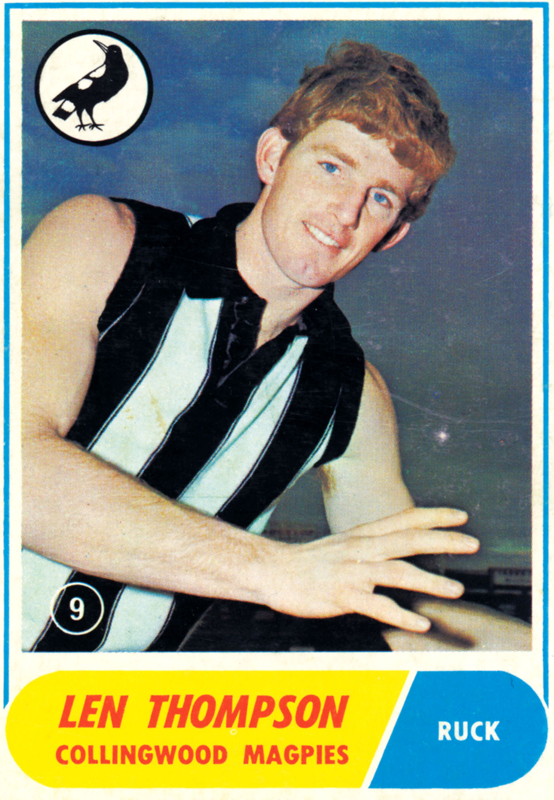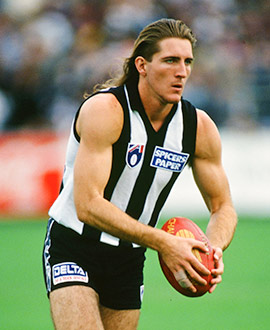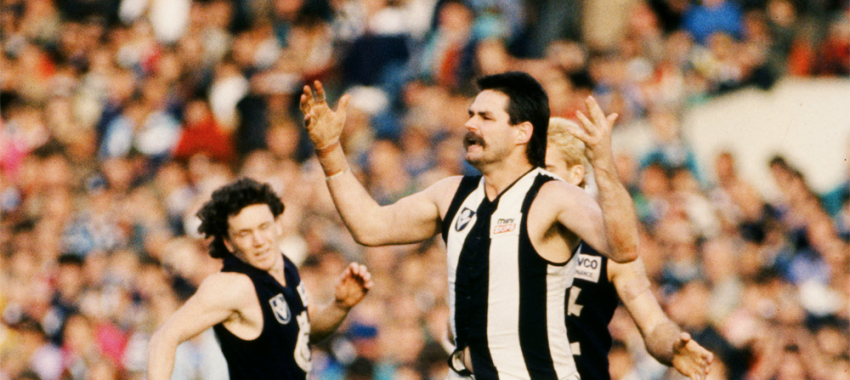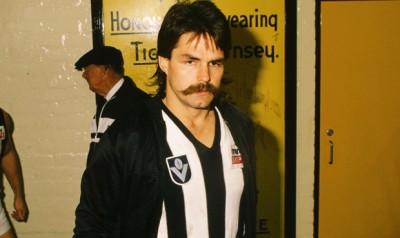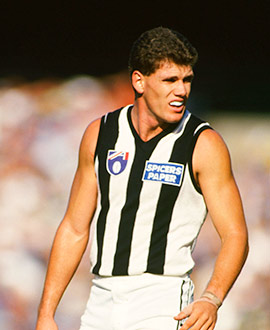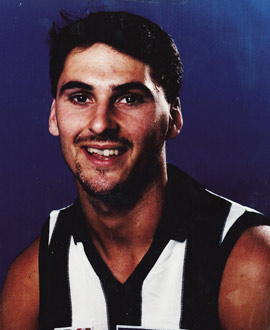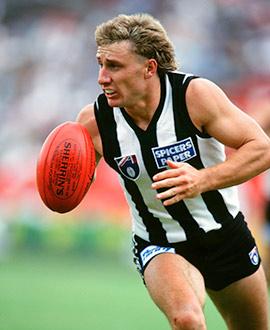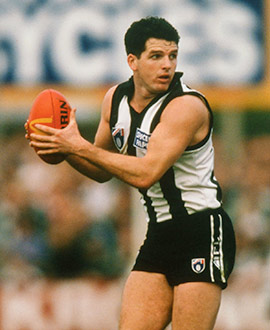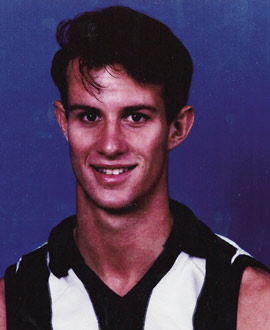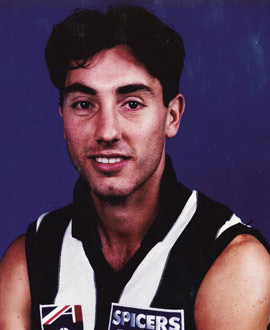By: Glenn McFarlane
A multitude of reasons and excuses have been offered up for starting melees in the AFL, but surely a broken-down bus stands as one of the most unique.
To top it off, the bus wasn't even carrying any of the footballers from either side.
Yet that was the excuse wheeled out (pardon the pun) for the pre-game dust-up between Collingwood and Essendon that made all sort of headlines.
The clash took place as soon as the Magpies ran through their banner. It's not every game that players are caught pushing and shoving even before the captains had tossed the coin to see which way the teams were kicking.
But that's what happened in the round 20 game in 1994 between the Magpies and the Bombers, and the 76,565 fans in attendance were on their feet even before the timekeepers sounded the opening siren.
The Herald Sun described the scene: "(The) all-in brawl had the crowd roaring even before the teams had started their pre-match exercises.""
Collingwood burst through its banner and, by coincidence or otherwise, crossed the path of the Essendon team jogging towards the centre of the ground.
"Even the umpires in the centre square were caught unawares by the ferocious confrontation which is sure to be scrutinised closely by AFL officials in their weekly video-tape check-up."
The Age was equally breathless: "The two teams brawled for several minutes before the first bounce, sparked by a clash between Collingwood ruckman Damian Monkhorst and his Essendon counterpart, Steven Alessio.
"All 42 players (and several officials) were involved and it remained a spiteful affair thereafter, not unlike the 1990 Grand Final between these two clubs."
It wasn't as brutal as the 1990 quarter-time chaos, but it was still an incident that had the AFL greatly concerned about in terms of the image of the game.
In that game, the two teams used the change rooms in the Great Southern Stand, something which doesn't happen anymore.
The AFL's football operations manager Ian Collins was furious with the pre-game clash, saying: "They (the teams) were far too close together...they can hear everything the other camp says."
Collins promised a quick investigation into the matter.
Even Collingwood coach Leigh Matthews was angry with what transpired in those two or three minutes of the brawl.
Matthews said: "I don't know how it happened, but it shouldn't have happened. Players should not be engaged in physical contact before the siren.
"That aside, I suppose that (the brawl) was indicative of a desperate game - both sides were keen to get into it. To be honest, I don't know who caused it, whether it was us or them.
"I told them to keep their eyes on the ball because the umpires are going to be nervous."
That was the same message Matthews had given his players following that infamous quarter-time brawl in the 1990 Grand Final.
Incredibly, Essendon coach Kevin Sheedy - who was involved in one of the 1990 skirmishes - had time to address his players in an effort to calm them down between the fight and the first siren.
Sheedy said: "I just told the players not to get reported."
In the end, one player, Monkhorst, would be penalised out of that incident, though Essendon's Glenn Manton would his number taken for a later incident.
In the investigation that followed, it was alleged that the reason for Collingwood's team being so close to the Essendon side - with most of their players still in their tracksuit tops - was the late arrival of a bus.
Magpie president Allan McAlister said a bus carrying the Collingwood cheersquad had broken down on the way to the MCG.
The delay brought about a last-minute re-positioning of the banner, when ground officials refused to allow them into the area they were originally were meant to be.
As a result, the club's banner was raised far too close to Essendon's group, which played a role in putting the teams on a collision course.
Then a strange thing happened. After both clubs had pushed and shoved, the two skippers, Gavin Brown and Mark Thompson, ran to the middle and shook hands. They wished each other well and got down to business.
Collingwood had brought back Brown after a three-week hamstring injury and Tony Woods in for his first game that season at the expense of Brett James and Aaron James.
Three of the Magpies' team that day had played less than 10 games - Trent Hotton (second game), Paul Sharkey (fifth) and Andrew Tranquilli (ninth), while 34-year-old Tony Shaw was playing his 308th match.
Shaw would turn in another outstanding game, having 31 touches, kicking a goal and winning two Brownlow Medal votes, Tony Francis got the three votes and Monkhorst earned the one vote.
The Magpies might have been seen to be the instigators of the initial angst, but the first free kick of the game went their way, and Collingwood had three goals on the board before Essendon scored one.
Essendon hit back almost immediately. By quarter-time, each of the sides had four goals, with Collingwood leading by only two points at the first change.
Tempers almost boiled over at quarter-time once more, but sanity prevailed.
The dangerous Joe Misiti put Essendon in front early in the second term, but it only seemed to spark the Magpies into action.
Collingwood kicked five unanswered goals - and six for the second term - which set up a half-time lead of 27 points. It could have been more with the scoreline of 10.12 (72) to Essendon's 7.3 (45).
The negative for the Pies came when Saverio Rocca was carried off on a stretcher after landing awkwardly. His ankle injury ended his day, with his two early goals being his contribution.
Rocca's absence would open up the game for Jason McCartney, who would end up kicking four goals in his 33rd game for Collingwood. He would only have five more games in Black and White before stints at Adelaide and more famously North Melbourne.
But the Bombers had their own issues with Paul Salmon going off the ground with a shoulder injury after copping a legal shirtfront from Shane Watson, who was one of his team's best players.
Yet Essendon gave a hint of some life early in the third term, creeping back to within 17 points before Collingwood regained their composure, especially after Mark Thompson went off injured with a broken arm.
Five goals to nil followed for the Magpies for the remainder of the quarter. It ended up being a seven-goal third term for Collingwood, as the margin bloated out to a comfortable 49 points.
It didn't end the way Matthews wanted as Essendon kicked six goals to two in the final term, as the final deficit ended up being 28 points in Collingwood's favour.
And there was even a bit of push and shove - and a little bit more - during the last term when Manton was reported for striking Mark Fraser.
Fraser tried to help Manton out at the tribunal, explaining: "I was a bit stunned by it because it sat me on my backside and I wasn't expecting it...but it wasn't a heavy blow."
It didn't help. Manton got two weeks.
Matthews was frustrated that Collingwood had given up a chance to convincingly defeat Essendon with a less than impressive final term.
Buckley was an important player, with 24 touches, while Francis, Brown, Scott Russell and Mark Fraser were all solid performers.
Monkhorst gave his team first use of the ball, Mick McGuane nailed three goals (including a banana kick on the run in the last term), while Woods and Tranquilli also kicked two each.
An AFL investigation was launched immediately after the match, and much of the media debate was sparked by Patrick Smith, who was then working at The Age.
Smith wrote a provocative comment, saying: "Mark down Friday 5 August as one of the sadder days in Australian football. It is the day that more than 40 grown men scragged, scratched, punched and pushed before the first bounce, before Rex Hunt could hit a high C, and before Collingwood had completed a lap.
"Forty-two athletes and several officials out of control; abiding no rules; umpires powerless. Had anything like this happened on the street men would have been arrested.
"It will be defended by men with thick ears and crooked noses. They will call it a man's game. Some will call it theatre. They are wrong, hopelessly wrong."
Smith insisted that the two clubs must be fined. They weren't, but Monkhorst was singled out by the AFL for starting it, even though that seemed unfair, given how many other players took part in the incident.
Monkhorst, who was clearly so influential in the game, paid the price for his actions when the AFL Commission fined him $5000.
It came about after AFL investigator Max Croxford interviewed players and officials, which stretched out through the week, making McAlister furious that the ruckman had been singled out while others weren't.
"I'm extremely disappointed," McAlister said.
"I'm advised it's intended by the AFL to put rules in place to cope with similar instances in the future."
"A decision has taken almost seven days to the hour...less than 24 hours before Damian Monkhorst and his club are engaged in a most vital match (against Melbourne) to see if they will participate in the finals series."
Collingwood would participate in the finals, but would ultimately fall just short in a brave performance at the WACA against eventual premiers West Coast.
For that game, most of the cheersquad took the plane, not the bus.
